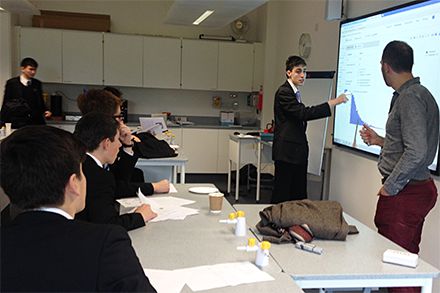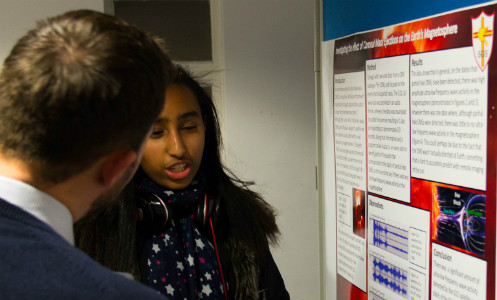About
 School students typically have limited opportunities to experience science in the way that researchers do. Furthermore, one-off outreach interventions are known to generally show little to no long term impact on students. For these reasons the Department of Physics and Astronomy has developed its Physics Research in School Environments (PRiSE) programme — protracted independent research projects based around the scientific research undertaken within the department, which are free and accessible to school students from all backgrounds and supervised by our active researchers.
School students typically have limited opportunities to experience science in the way that researchers do. Furthermore, one-off outreach interventions are known to generally show little to no long term impact on students. For these reasons the Department of Physics and Astronomy has developed its Physics Research in School Environments (PRiSE) programme — protracted independent research projects based around the scientific research undertaken within the department, which are free and accessible to school students from all backgrounds and supervised by our active researchers.
Aims
To raise students’ Physics (and more generally STEM) aspirations our PRiSE programme aims to:
- Increase awareness of current Physics research questions with 14–18 year old / GCSE & A-Level school students.
- Enable students to develop a better understanding of how scientific research works by conducting sustained independent research projects.
- Provide students with a framework to develop their own independent research in collaboration with active researchers.
- Reconnect teachers with their subject at an academic/research-level and build their confidence in supporting students with material beyond the curriculum, developing sustained deep engagement with schools over several years
How it works
We have developed a number of exciting projects based around the areas of research within the Department of Physics and Astronomy. We run these projects over the first two terms of the academic year. Students get introduced to the project area in a kick-off session featuring a talk and interactive workshop, where they also get given all the resources required to continue working on their project.
 Following this kick-off, students should work in small groups (of around 4-6 students) initially on prescribed activities detailed in their guide to build confidence in the project area. This stage is followed by their own independently motivated project, which may be based around their own interests, results which have come from their initial work, or one of the suggested areas in the guide. We recommend students start work on this latter stage around December time and try to spread the workload out across the entire six months, spending no more than a few hours a week on it. How this is split between lesson time, teacher organised time, or left to their own initiative will vary depending on the teacher and school. Throughout this time the students will be supported not only by their teachers (who we provide with extra resources for initial assistance) but also by active researchers from the Department of Physics and Astronomy. This supervision will be provided either in person or remotely (depending on availability, distance, and number of students) approximately 3-4 times throughout the project's entire duration.
Following this kick-off, students should work in small groups (of around 4-6 students) initially on prescribed activities detailed in their guide to build confidence in the project area. This stage is followed by their own independently motivated project, which may be based around their own interests, results which have come from their initial work, or one of the suggested areas in the guide. We recommend students start work on this latter stage around December time and try to spread the workload out across the entire six months, spending no more than a few hours a week on it. How this is split between lesson time, teacher organised time, or left to their own initiative will vary depending on the teacher and school. Throughout this time the students will be supported not only by their teachers (who we provide with extra resources for initial assistance) but also by active researchers from the Department of Physics and Astronomy. This supervision will be provided either in person or remotely (depending on availability, distance, and number of students) approximately 3-4 times throughout the project's entire duration.
Each year's programme culminates in a special student conference 'Cosmic Con' on campus before the Easter break, where each group of students presents their work either as a talk or poster presentation. Prizes are awarded to some of the best presentations of the evening and all attendess receive a letter of thanks for participating in the programme. Family, friends and school staff are all encouraged to attend and the conference is well catered with a variety of local artisan pizzas.
| Oct | Nov | Dec | Jan | Feb | Mar |
|---|---|---|---|---|---|
| Kick-off | |||||
| Prescribed Work | |||||
| Independent Project | |||||
| School Visit | School Visit | ||||
| Writing Up | |||||
| Student Conference | |||||
While this is the format we typically use given the time-pressures on students and teachers throughout the academic year, students can still continue project work beyond this schedule and indeed progress with their projects over several years.
Why get involved?
A recent report by the Wellcome Trust has highlighted that only a minority of students across the country and global are given the opportunity to undertake independent research projects, with only some of of those being supported by a mentor from university or industry. Our programme has been carefully developed and has grown slowly over a number of years to ensure it is effective in its aims and has a positive influence on everyone involved. We have found that students increase their confidence in scientific topics and methods, develop a multitude of different skills, and report glowingly on their experience of projects. Teachers learn new physics and skills which they can implement or refer to in future lessons, gain confidence in supporting extra curricular activities, and develop lasting relationships with HE bodies. You can find out more about these benefits in our evaluation section.
The Department of Physics and Astronomy's PRiSE programme has been recognised with the following awards:
- Times Higher Education Awards 2019, Widening Participation or Outreach Initiative of the year Shortlisted: PRiSE
- QMUL Public Engagement Awards 2019, Involve Award Winner: MUSICS
- SEPnet Public Engagement Awards 2017, Impact Project Award Winner: Research in Schools
- QMUL Public Engagement Awards 2017, Inspire Award Shortlisted: Research in Schools
It has been championed by the Royal Society, The Ogden Trust and across SEPnet.